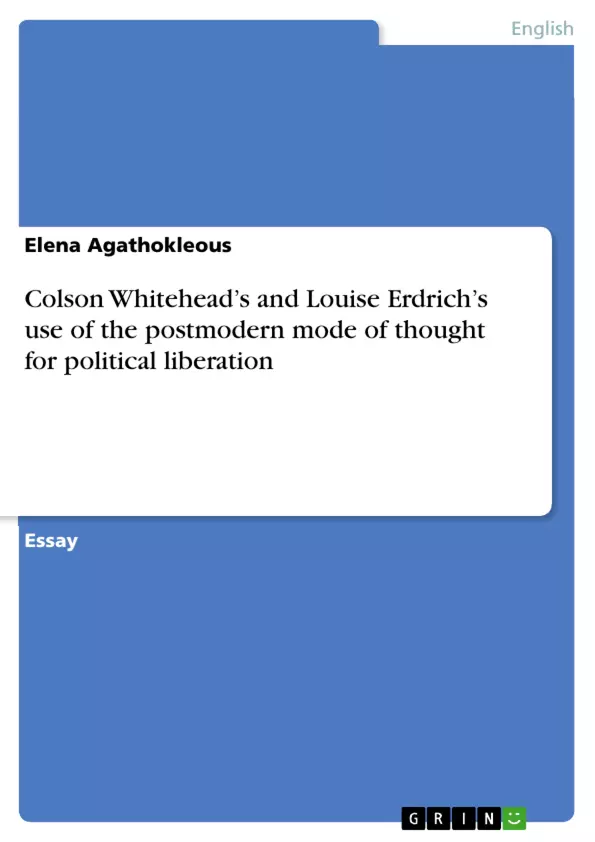The essay deals with Colson Whitehead’s and Louise Erdrich’s use of the postmodern mode of thought for political liberation.
Both Colson Whitehead and Louise Erdrich originate from people who have suffered oppression in inhumane ways and still face it in current times. Their novels take on the task to allow history to resurface and retell the histories of the past in a way that makes them popular to contemporary readers while at the same time their novels become narratives which call for political liberation.
Inhaltsverzeichnis (Table of Contents)
- Whitehead's and Erdrich's use of the postmodern mode of thought for political liberation
- The Underground Railroad: A Journey of Freedom and Resistance
- Cora's Journey: A Blend of Reality and Fantasy
- The Politics of History: Reclaiming the Narrative of Slavery
- Hope for the Future: A Call for Social Change and Political Liberation
- The Round House: A Post-colonial Narrative of Identity and Resistance
- A Fragmented Narrative: Exploring Different Perspectives
- Merging Cultures: A Common Ground for Understanding
- Trickster Traits: Reconstructing Native American Identity
Zielsetzung und Themenschwerpunkte (Objectives and Key Themes)
This essay explores how Colson Whitehead and Louise Erdrich utilize the postmodern mode of thought in their novels, "The Underground Railroad" and "The Round House," respectively, to challenge dominant narratives and advocate for political liberation. Both authors aim to reclaim history and retell the stories of oppressed communities, highlighting the ongoing struggle for social justice and equality.
- Postmodernism as a tool for political liberation
- The power of narrative in reshaping history
- The enduring legacy of oppression and the fight for social justice
- Cultural identity and the complexities of post-colonial experiences
- The role of the reader in shaping meaning and understanding
Zusammenfassung der Kapitel (Chapter Summaries)
The Underground Railroad: A Journey of Freedom and Resistance
This chapter focuses on Colson Whitehead's novel "The Underground Railroad" and its use of postmodernism to explore the horrors of slavery and the ongoing fight for freedom. The chapter analyzes the novel's inventive representation of history, its blend of realism and fantasy, and its powerful political message about the enduring legacy of white supremacy.
The Round House: A Post-colonial Narrative of Identity and Resistance
This chapter examines Louise Erdrich's novel "The Round House" and its exploration of Native American identity and resistance against colonial oppression. The chapter delves into the novel's fragmented narrative structure, its merging of cultures, and its use of trickster characters to challenge dominant narratives and reclaim Native American voices.
Schlüsselwörter (Keywords)
Postmodernism, political liberation, slavery, oppression, social justice, narrative, history, cultural identity, colonialism, Native Americans, trickster, resistance, representation, fragmentation, interconnectivity.
Frequently Asked Questions
How do Whitehead and Erdrich use postmodernism for political liberation?
They use postmodern techniques like fragmentation and blending reality with fantasy to challenge dominant historical narratives and advocate for the rights of oppressed communities.
What is the significance of the "Underground Railroad" in Whitehead's novel?
Whitehead reimagines the historical network as a literal, physical train system, using this fantastic element to explore the grim reality of slavery and the legacy of white supremacy.
How does Louise Erdrich explore Native American identity in "The Round House"?
Erdrich uses a fragmented narrative and "trickster" characters to depict the complexities of post-colonial experiences and the resistance against colonial oppression.
What role does the reader play in these postmodern novels?
The postmodern mode often requires the reader to actively shape meaning and understand the interconnectivity between past trauma and current social justice struggles.
Why is reclaiming the narrative important for political liberation?
By retelling history from the perspective of the oppressed, these authors break the silence imposed by dominant cultures and empower marginalized voices.
What are "trickster traits" in Erdrich’s work?
Tricksters are figures from Native American mythology who use wit and subversion to challenge authority, serving as a symbol for cultural survival and resistance.
- Arbeit zitieren
- Elena Agathokleous (Autor:in), 2021, Colson Whitehead’s and Louise Erdrich’s use of the postmodern mode of thought for political liberation, München, GRIN Verlag, https://www.grin.com/document/1007723



